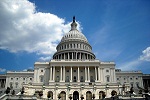 AFP: A key US Senate panel adopted a sweeping package of tough new sanctions Thursday aimed at forcing Iran to freeze its suspect nuclear program amid escalating worries of a military confrontation.
AFP: A key US Senate panel adopted a sweeping package of tough new sanctions Thursday aimed at forcing Iran to freeze its suspect nuclear program amid escalating worries of a military confrontation.  WASHINGTON (AFP) — A key US Senate panel adopted a sweeping package of tough new sanctions Thursday aimed at forcing Iran to freeze its suspect nuclear program amid escalating worries of a military confrontation.
WASHINGTON (AFP) — A key US Senate panel adopted a sweeping package of tough new sanctions Thursday aimed at forcing Iran to freeze its suspect nuclear program amid escalating worries of a military confrontation.
The Senate Banking Committee approved the harsh new measures by voice vote, without dissent, as part of a mounting campaign in the US Congress to tighten the economic screws on the defiant Islamic republic.
The legislation targets Iran’s national oil and tanker firms, its elite Islamic Revolutionary Guards Corps (IRGC), and would for the first time widen sanctions on Iran’s energy sector to any joint venture anywhere in the world where Iran’s government is a substantial partner or investor.
“We are giving Iran’s leaders a clear choice,” said Democratic Senator Tim Johnson, the committee’s chairman, who co-authored the core of the legislation with the panel’s top Republican, Richard Shelby.
“Iran can end its suppression of its own people, come clean on its nuclear program, suspend enrichment, and stop supporting terrorist activities around the globe. Or it can continue to face sustained, intensifying multilateral economic and diplomatic pressure deepening its international isolation,” Johnson said.
Shelby said he is “hopeful that the full Senate will consider and pass it soon.”
The White House, which says President Barack Obama’s diplomacy has framed the most punishing range of sanctions ever faced by Iran, did not give an immediate reaction to the bill.
“We’re reviewing the legislation and will make our views known at an appropriate time,” a White House official said.
“We look forward to continuing to work with Congress to identify ways to increase pressure on the Iranian regime.”
Iran denies Western charges that it seeks the ability to build a nuclear weapon, insisting its atomic activities are an effort to develop a civilian power-production capability.
The legislation does not specify the names of companies that would be affected — and leaves it to the executive branch to make that determination in many cases.
But some activist groups, like United Against A Nuclear Iran (UNANI) have urged pressure on a wide range of firms, from Germany’s Siemens engineering giant to France’s Renault, to stop doing business in Iran.
The bill calls for a US travel ban and freezing of US assets aimed at individuals and firms that provide Tehran with technology — everything from rubber bullets to surveillance equipment — used to repress dissent.
It also would tighten sanctions aimed at the IRGC, including bans on travel to the United States, a freezing of US assets, and targeting “anyone who materially assists” the IRGC with other punitive measures.
It would require firms competing for US government contracts to certify that they and their subsidiaries have not had “significant economic transactions” with the IRGC or individuals or entities connected to it.
It calls for imposing sanctions on firms that invest in projects involving Iranian officials, companies or go-betweens in the mining, production or transportation of uranium anywhere in the world.


